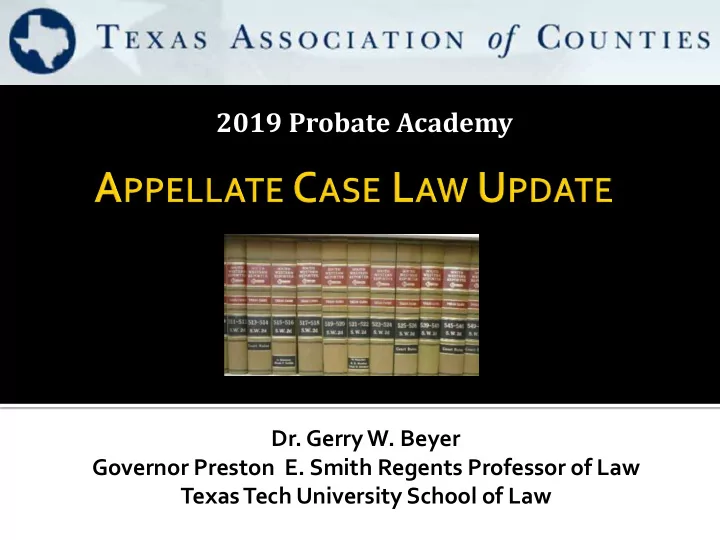

2019 Probate Academy Dr. Gerry W. Beyer Governor Preston E. Smith Regents Professor of Law Texas Tech University School of Law 1
2
3
4
5
The appellate court: A. Affirmed, because the trial judge’s decision on evidence admissibility is final. B. Affirmed, because the expert failed to explain the perceived differences between the signatures. C. Reversed, because the expert’s testimony raised a fact issue regarding the signature. D. Reversed, because forgery is always an issue for the jury. 6
7
The appellate court: A. Affirmed, because the blinking system was sufficient to establish the testator’s directions. B. Affirmed, because the trial court’s decision on the validity of a signature is not reversible. C. Reversed, because proxy testator signatures are not allowed in Texas. D. Reversed, because the proxy did not also sign the proxy’s own name on the will. 8
9
The appellate court: A. Affirmed, because joint wills are contractual wills. B. Affirmed, because fairness indicates that all four children be treated the same. C. Reversed, because joint wills are not presumed contractual. D. Reversed, because contractual wills are not valid in Texas. 10
11
The appellate court: A. Affirmed, because it did not matter that one of the conditions was not satisfied. B. Affirmed, because the trial court’s result prevented intestacy. C. Reversed, because none of the conditions disposing of the other 60% estate were satisfied. D. Reversed, because the attorney for the testator should have the opportunity to testify about his/her client’s intent. 12
13
The Texas Supreme Court: A. Reversed, allowing the trial court’s award to stand. B. Reversed, remanded for a new determination of damages. C. Affirmed, holding that under the facts, the defendant did not tortiously interfere with inheritance rights. D. Affirmed, holding that Texas does not recognize an action for tortious inference with inheritance rights. 14
15
May a lawyer serve as both executor and counsel for the executor? A. No. B. Yes, there are no potential conflicts of interest. C. Yes, but only after evaluating the potential conflicts of interest. 16
17
The appellate court A. Affirmed, because the trial court’s determination of heirship was not a final order. B. Affirmed, because the neighbor was not an interested person and thus lacked standing. C. Reversed, because the neighbor had a claim against the decedent . D. Reversed, because the neighbor had a claim against the decedent’s estate . 18
19
The appellate court: A. Affirmed, because the alleged trust conveyance lacked testamentary intent. B. Affirmed, because the decedent could not add property to the trust. C. Reversed, because the judge abused his discretion and acted without reference to guiding rules and principles. D. Reversed, because the trial court should always grant pleas in intervention. 20
21
The Texas Supreme Court: A. Affirmed, because the excuse was too weak. B. Affirmed, because the default of Decedent binds subsequent claimants. C. Reversed and admitted the will to probate because default only applies to the applicant. D. Reversed and remanded permitting the executrix to attempt to probate will in her individual capacity because default only applies to the applicant. 22
23
The appellate court: A. Affirmed, mandatory arbitration clauses are against public policy. B. Affirmed, the successor administrator neither expressly nor impliedly agreed to the provision. C. Reversed, the successor administrator is deemed to have agreed to the arbitration provision by accepting the position. D. Reversed for additional findings. 24
25
The appellate court: A. Affirmed, because the claim predated the settlement agreement. B. Affirmed, because the claim had no merit. C. Reversed, because settlement agreements are not favored under Texas law. D. Reversed, because the settlement agreement was invalid. 26
27
The appellate court: A. Affirmed, because there was sufficient supporting evidence of the time the attorney spent on the case. B. Affirmed, because the attorney had a reputation of charging fair fees. C. Reversed, because the trial court did not find that the fees were both necessary and reasonable. D. Reversed, because court permission had not been obtained to hire this attorney. 28
29
The appellate court: A. Affirmed, because the amount of fees was reasonable. B. Affirmed, because there was insufficient evidence to support the jury’s finding. C. Reversed, because the evidence was insufficient to set aside the jury verdict. D. Reversed, because the amount of fees was unreasonable. 30
31
The appellate court: A. Affirmed, because there was no evidence that the caregiver exercised undue influence. B. Affirmed, because undue influence must be proved using clear and convincing evidence. C. Reversed, because leaving $1.5 million to a caregiver is likely to be caused by undue influence. D. Reversed, because the testator omitted his relatives from his will. 32
33
The appellate court: A. Affirmed, because there is a special relationship between a person disposing of a decedent’s remains and the next of kin. B. Affirmed, because Texas law provides a statutory penalty for this situation. C. Reversed, because the court will not reward “weak” family members who manufacture mental anguish “damages.” D. Reversed, because there was no contract between the suing family members and the funeral home. 34
35
Recommend
More recommend